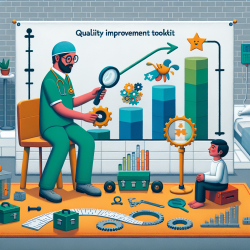Introduction
In the realm of speech-language pathology, particularly when working with children, the implementation of evidence-based practices is crucial for achieving optimal outcomes. A recent systematic review, "Spread tools: a systematic review of components, uptake, and effectiveness of quality improvement toolkits," provides valuable insights into how toolkits can be utilized to enhance healthcare quality. This blog post will explore how practitioners can leverage these findings to improve their skills and outcomes in speech-language pathology.
Understanding Quality Improvement Toolkits
Quality improvement toolkits are collections of resources designed to facilitate the implementation and spread of effective interventions across different settings. These toolkits typically include educational materials, care plans, decision-support tools, and patient education resources. They are intended to help healthcare providers incorporate best practices into routine care.
Key Findings from the Systematic Review
The systematic review analyzed 77 studies evaluating 72 toolkits, revealing several critical components and their effectiveness:
- Most toolkits included introductory and implementation materials, such as research summaries and care plans.
- Approximately two-thirds of the toolkits contained patient education materials.
- High satisfaction with toolkits was reported, although the perceived usefulness of individual tools varied.
- Uptake data were limited, indicating variability in toolkit adoption.
- While toolkits showed positive effects on clinical processes, more research is needed to link them to objective provider behavior measures and patient outcomes.
Implementing Toolkits in Speech-Language Pathology
For speech-language pathologists, particularly those working with children, implementing quality improvement toolkits can enhance practice and outcomes. Here are some strategies based on the review findings:
- Adopt Evidence-Based Practices: Utilize toolkits that provide evidence-based guidelines and care plans tailored to speech-language pathology.
- Focus on Patient Education: Ensure that toolkits include materials that can be shared with parents and caregivers to support home-based interventions.
- Evaluate Toolkit Components: Assess the usefulness of individual toolkit components in your practice and adapt them as necessary to fit your clinical context.
- Engage in Continuous Improvement: Use toolkits as part of a broader quality improvement strategy, regularly evaluating their impact on clinical outcomes and making necessary adjustments.
Encouraging Further Research
While the review highlights the potential of toolkits, it also underscores the need for further research to establish their effectiveness in different settings. Speech-language pathologists are encouraged to participate in research initiatives that explore the impact of toolkits on child outcomes and provider behaviors.
Conclusion
Quality improvement toolkits offer a promising avenue for enhancing speech-language pathology practices. By leveraging the components and strategies outlined in the systematic review, practitioners can improve their skills and outcomes for children. For those interested in delving deeper into the research, the original paper, "Spread tools: a systematic review of components, uptake, and effectiveness of quality improvement toolkits," can be accessed here.










